except和exceptfor区别
except和exceptfor的区别

except和exceptfor的区别except和except for的区别一、引言在英语中,except和except for是两个常用的介词短语,它们都表示“除了之外”。
虽然它们的意思相似,但在用法和语境上存在着明显的区别。
本文将从多个角度探讨except和except for的不同之处。
二、含义和用法1.except的含义和用法except意为“除了之外”,表示在某个整体或集合中,除了某个或某些特定的部分或元素之外,其余的部分或元素都具有某种特性或符合某种条件。
它后面通常接名词、代词、动词-ing形式或从句。
例如:Everyone except Tom went to the park yesterday. 昨天除了汤姆,大家都去了公园。
I like all sports except swimming. 除了游泳,我喜欢所有的运动。
2.except for的含义和用法except for意为“除了之外”,表示在某个整体或集合中,除了某个或某些特定的部分或元素之外,其余的部分或元素都不具有某种特性或不符合某种条件。
它后面通常接名词、代词或动词-ing形式。
例如:The room is empty except for a few chairs. 除了几把椅子,房间是空的。
Your composition is good except for a few spelling mistakes. 除了几个拼写错误,你的作文写得很好。
三、区别和联系1.语境和用法的区别except通常用于在整体上排除某个或某些特定的部分或元素,强调剩余部分或元素的共性。
而except for则用于在整体上指出某个或某些特定的部分或元素的差异,强调剩余部分或元素的不共性。
因此,except for常常用来对某个整体或集合进行评价或判断,指出其中的不足之处。
例如:All the students except John passed the exam. 除了约翰,所有的学生都通过了考试。
英语 except 和 except for的区别
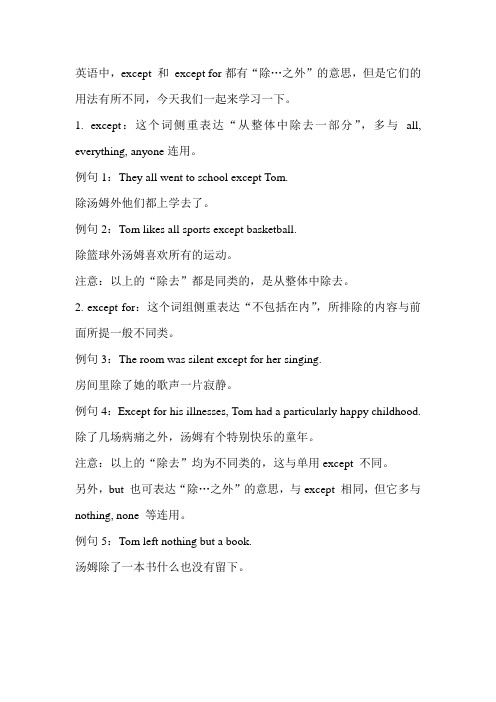
英语中,except 和except for都有“除…之外”的意思,但是它们的用法有所不同,今天我们一起来学习一下。
1. except:这个词侧重表达“从整体中除去一部分”,多与all, everything, anyone连用。
例句1:They all went to school except Tom.
除汤姆外他们都上学去了。
例句2:Tom likes all sports except basketball.
除篮球外汤姆喜欢所有的运动。
注意:以上的“除去”都是同类的,是从整体中除去。
2. except for:这个词组侧重表达“不包括在内”,所排除的内容与前面所提一般不同类。
例句3:The room was silent except for her singing.
房间里除了她的歌声一片寂静。
例句4:Except for his illnesses, Tom had a particularly happy childhood. 除了几场病痛之外,汤姆有个特别快乐的童年。
注意:以上的“除去”均为不同类的,这与单用except 不同。
另外,but 也可表达“除…之外”的意思,与except 相同,但它多与nothing, none 等连用。
例句5:Tom left nothing but a book.
汤姆除了一本书什么也没有留下。
except 和 except for 的区别
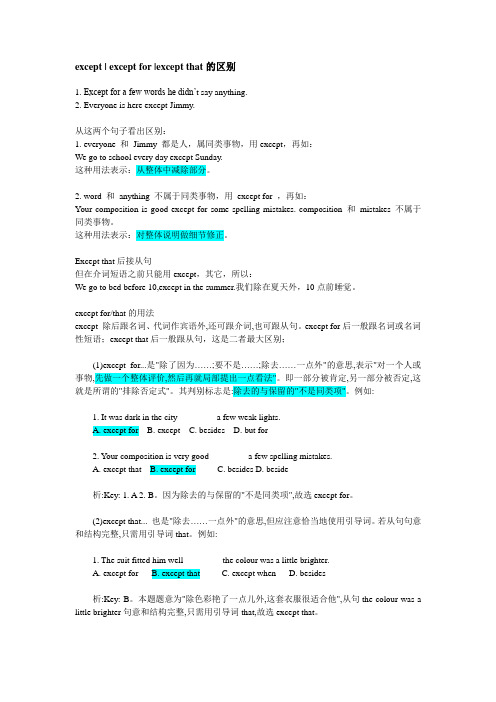
except | except for |except that的区别1. Except for a few words he didn’t say anything.2. Everyone is here except Jimmy.从这两个句子看出区别:1. everyone 和Jimmy 都是人,属同类事物,用except,再如:We go to school every day except Sunday.这种用法表示:从整体中减除部分。
2. word 和anything 不属于同类事物,用except for ,再如:Your composition is good except for some spelling mistakes. composition 和mistakes 不属于同类事物。
这种用法表示:对整体说明做细节修正。
Except that后接从句但在介词短语之前只能用except,其它,所以:We go to bed before 10,except in the summer.我们除在夏天外,10点前睡觉。
except for/that的用法except 除后跟名词、代词作宾语外,还可跟介词,也可跟从句。
except for后一般跟名词或名词性短语;except that后一般跟从句,这是二者最大区别;(1)except for...是"除了因为……;要不是……;除去……一点外"的意思,表示"对一个人或事物,先做一个整体评价,然后再就局部提出一点看法"。
即一部分被肯定,另一部分被否定,这就是所谓的"排除否定式"。
其判别标志是:除去的与保留的"不是同类项"。
例如:1. It was dark in the city ________ a few weak lights.A. except forB. exceptC. besidesD. but for2. Your composition is very good ________ a few spelling mistakes.A. except thatB. except forC. besidesD. beside析:Key: 1. A 2. B。
except for except besides辨析 -回复

except for except besides辨析-回复题目:Except for, except, besides辨析导言:在英语中,一些词语在表达“除了某事物之外”时经常被使用,其中包括“except for”,“except”,以及“besides”。
这三个词在用法上有着一些细微的差别,本文将逐一解释其用法,以帮助读者更好地理解和运用这些表达方式。
一、Except for“Except for”是一个介词短语,常用来表达在某种情况下除外的意思。
它通常用于以肯定句的形式,可以在句子的任何位置使用。
例如:1. Except for the rain, the picnic was a great success.除了下雨以外,这次野餐很成功。
2. We all went to the party, except for John.我们都去了聚会,除了约翰。
二、Except“Except”可以是一个介词,也可以是一个连词。
它常用于否定句中,表示在某种情况下除外。
与“except for”不同的是,它通常用于句首或句尾,而不在句子中间。
例如:1. Everyone attended the meeting except Tom.除了汤姆,大家都参加了会议。
2. I have read all the books on the shelf, except that one.我读了书架上的所有书,就差那一本。
三、Besides“Besides”是一个副词,它的用法稍有不同。
它通常用来表示额外的信息或者是补充的观点,并不是用来表示除外的意思。
例如:1. Besides English, she also speaks French and Spanish.除了英语,她还会讲法语和西班牙语。
2. Besides being a talented musician, he is also a skilled painter.除了是一位才华横溢的音乐家,他还是一位熟练的画家。
英语中表示否定的前缀及except, except for区别
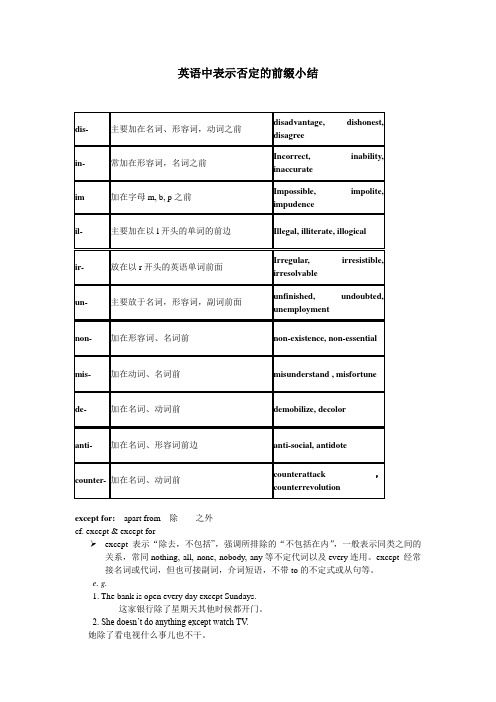
英语中表示否定的前缀小结except for: apart from 除······之外cf. except & except forexcept表示“除去,不包括”,强调所排除的“不包括在内”,一般表示同类之间的关系,常同nothing, all, none, nobody, any等不定代词以及every连用。
except 经常接名词或代词,但也可接副词,介词短语,不带to的不定式或从句等。
e. g.1. The bank is open every day except Sundays.这家银行除了星期天其他时候都开门。
2. She doesn’t do anything except watch TV.她除了看电视什么事儿也不干。
except for也表示“除……以外”,只能加名词性结构指对某种基本情况进行具体的细节方面的修正。
它同except的区别是:except for后接的词同句子中的整体词(主语)不是同类的,指从整体中除去一个细节,一个方面;而except后接的词同整体词(主语)一般是同类的整体中除去一个部分。
e.g.1. Except for smoking and drinking, he is a thrifty man.除了抽烟、喝酒,他是个生活节俭的人。
2. His composition is excellent except for some grammatical mistakes.他的作文写得很好, 只有几处语法错误。
Choose the best answer:The older New England villages have changed relatively little____D_____ a gas station or two in recent decades. (CET4-2001-06-51)A) except B) besides C) in addition to D) except for。
except和except for区别
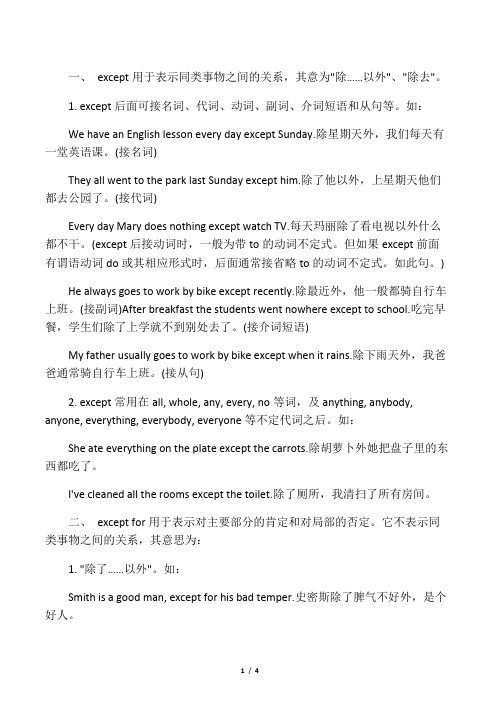
一、except用于表示同类事物之间的关系,其意为"除……以外"、"除去"。
1. except后面可接名词、代词、动词、副词、介词短语和从句等。
如:We have an English lesson every day except Sunday.除星期天外,我们每天有一堂英语课。
(接名词)They all went to the park last Sunday except him.除了他以外,上星期天他们都去公园了。
(接代词)Every day Mary does nothing except watch TV.每天玛丽除了看电视以外什么都不干。
(except后接动词时,一般为带to的动词不定式。
但如果except前面有谓语动词do或其相应形式时,后面通常接省略to的动词不定式。
如此句。
)He always goes to work by bike except recently.除最近外,他一般都骑自行车上班。
(接副词)After breakfast the students went nowhere except to school.吃完早餐,学生们除了上学就不到别处去了。
(接介词短语)My father usually goes to work by bike except when it rains.除下雨天外,我爸爸通常骑自行车上班。
(接从句)2. except常用在all, whole, any, every, no等词,及anything, anybody, anyone, everything, everybody, everyone等不定代词之后。
如:She ate everything on the plate except the carrots.除胡萝卜外她把盘子里的东西都吃了。
I've cleaned all the rooms except the toilet.除了厕所,我清扫了所有房间。
except和exceptfor的区别

except和exceptfor的区别except和except for一、except和except for都表示“除了”。
在all,every no,everything,anybody,nowhere这类词后面,两者都可用,后面跟名词或代词(后面是代词时,必须是宾格):——考点They all went to sleep except (for) Jim.除了吉姆他们都睡着了。
Everybody on me except (for) you.除了你谁都看不起我。
He ate the whole meal except(for)the beans.他把菜都吃了,除了豆子没吃。
We're all ready except (for) her).除了她我们都准备好了。
There's nobody I can trust except (for)him.除了他我谁都不信任。
(her——宾格,不能是主格she;只能用me,不能用I)——考点二、在其他情况下,只能用except for(可译为“除了……外):但用在all等词语前面时,只能用except for。
Except for John and Mary, nobody came.除了约翰和玛丽以外,谁也没有来。
三、except for一般用在名词短语前面。
l've cleaned the house except for the bathroom. 我已经把房子打扫了一遍.除了浴室以外。
The garden was empty except for one small bird. 花园里空荡荡的,只有一只小鸟。
四、介词和连词前面用except,不用except for.It's the same everywhere except in Scotland. 哪里都是一个样,除了在苏格兰。
五、在动词do后面,只能用except do sth. except+动词:Hedoes nothing except eat. do…except+不带to的动词不定式是一个常用的结构。
except,except for,besides区别
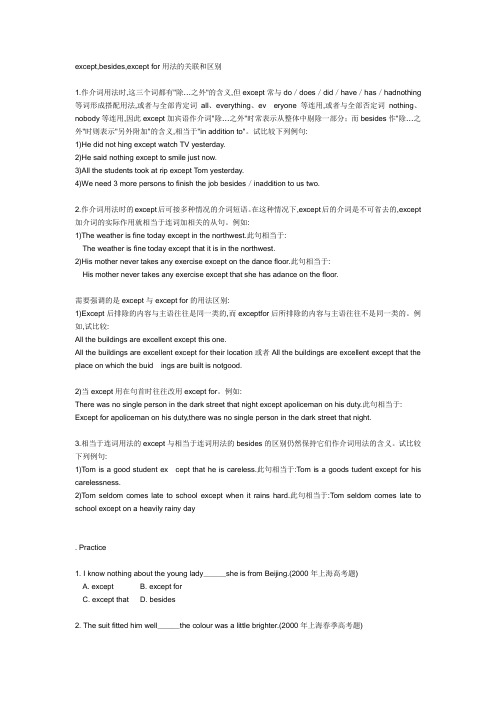
except,besides,except for用法的关联和区别1.作介词用法时,这三个词都有"除…之外"的含义,但except常与do/does/did/have/has/hadnothing 等词形成搭配用法,或者与全部肯定词all、everything、ev eryone等连用,或者与全部否定词nothing、nobody等连用,因此except加宾语作介词"除…之外"时常表示从整体中剔除一部分;而besides作"除…之外"时则表示"另外附加"的含义,相当于"in addition to"。
试比较下列例句:1)He did not hing except watch TV yesterday.2)He said nothing except to smile just now.3)All the students took at rip except Tom yesterday.4)We need 3 more persons to finish the job besides/inaddition to us two.2.作介词用法时的except后可接多种情况的介词短语。
在这种情况下,except后的介词是不可省去的,except 加介词的实际作用就相当于连词加相关的从句。
例如:1)The weather is fine today except in the northwest.此句相当于:The weather is fine today except that it is in the northwest.2)His mother never takes any exercise except on the dance floor.此句相当于:His mother never takes any exercise except that she has adance on the floor.需要强调的是except与except for的用法区别:1)Except后排除的内容与主语往往是同一类的,而exceptfor后所排除的内容与主语往往不是同一类的。
except,exceptfor,besides区别
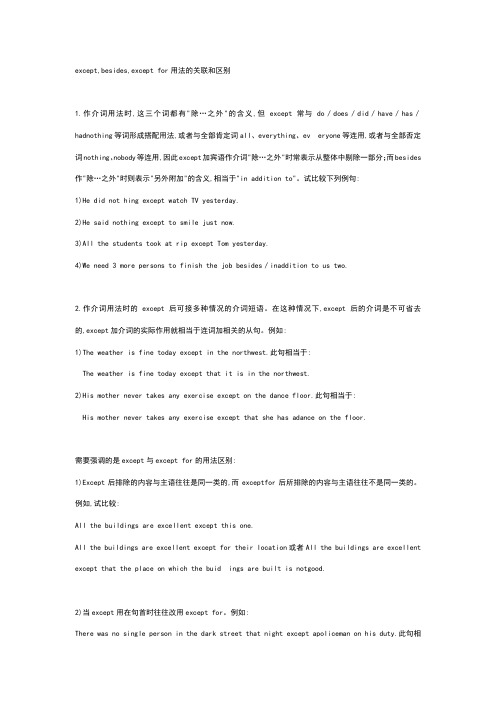
except,besides,except for用法的关联和区别1.作介词用法时,这三个词都有"除…之外"的含义,但except常与do/does/did/have/has/hadnothing等词形成搭配用法,或者与全部肯定词all、everything、ev eryone等连用,或者与全部否定词nothing、nobody等连用,因此except加宾语作介词"除…之外"时常表示从整体中剔除一部分;而besides 作"除…之外"时则表示"另外附加"的含义,相当于"in addition to"。
试比较下列例句:1)He did not hing except watch TV yesterday.2)He said nothing except to smile just now.3)All the students took at rip except Tom yesterday.4)We need 3 more persons to finish the job besides/inaddition to us two.2.作介词用法时的except后可接多种情况的介词短语。
在这种情况下,except后的介词是不可省去的,except加介词的实际作用就相当于连词加相关的从句。
例如:1)The weather is fine today except in the northwest.此句相当于:The weather is fine today except that it is in the northwest.2)His mother never takes any exercise except on the dance floor.此句相当于:His mother never takes any exercise except that she has adance on the floor.需要强调的是except与except for的用法区别:1)Except后排除的内容与主语往往是同一类的,而exceptfor后所排除的内容与主语往往不是同一类的。
except和exceptfor有什么区别?最后2组介词的用法来了!
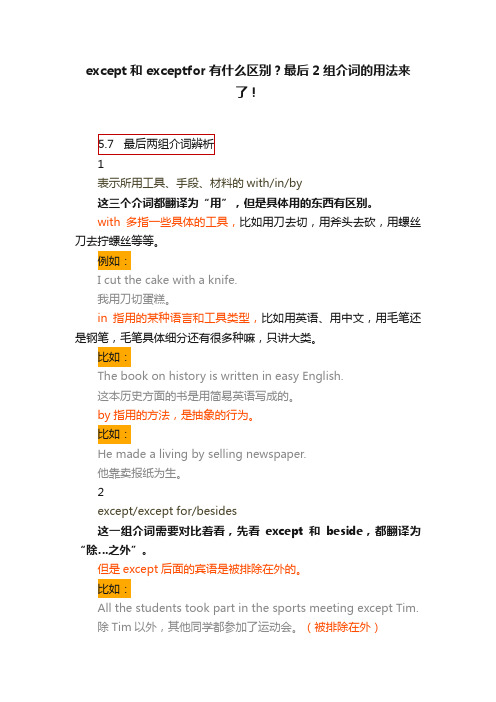
except和exceptfor有什么区别?最后2组介词的用法来了!1表示所用工具、手段、材料的with/in/by这三个介词都翻译为“用”,但是具体用的东西有区别。
with多指一些具体的工具,比如用刀去切,用斧头去砍,用螺丝刀去拧螺丝等等。
例如:I cut the cake with a knife.我用刀切蛋糕。
in指用的某种语言和工具类型,比如用英语、用中文,用毛笔还是钢笔,毛笔具体细分还有很多种嘛,只讲大类。
比如:The book on history is written in easy English.这本历史方面的书是用简易英语写成的。
by指用的方法,是抽象的行为。
比如:He made a living by selling newspaper.他靠卖报纸为生。
2except/except for/besides这一组介词需要对比着看,先看except和beside,都翻译为“除…之外”。
但是except后面的宾语是被排除在外的。
比如:All the students took part in the sports meeting except Tim.除Tim以外,其他同学都参加了运动会。
(被排除在外)而beside也翻译为“除…之外”,但是besides后面的宾语是包含在内的。
比如:We need three more books besides these two.除了这两本书我们还需要三本书。
(包含了这两本书)注意tip:beside是介词,表地点,“在…旁边”;besides也是介词,意思是“除…之外”。
看懂后再对比except和except for,意思基本一致,只是except for后面跟的宾语往往和主语不是同一类事物,比如看房子,我们会说“除了地段以外,房子还不错”,地段和房屋本身就是两回事;去一家餐厅吃饭,也可能说“除了服务质量以外,味道还是不错的”,服务和味道是两个事物,虽然有联系,不过毕竟不是同一类。
except和except for的区别

except和except for的区别except和except for表示的是一种排除关系,意思是“除了什么之外,不再有……”。
但except后面跟的词和主语一般是同类事物,而except for后面跟的词往往和主语不是同一类事物。
except for与except的区别一、except表示“除去,不包括”,强调所排除的“不包括在内”,一般表示同类之间的关系,常同nothing,all, none, nobody, any等不定代词以及every连用。
except 经常接名词或代词,但也可接副词,介词短语。
例如:1.You can have any of the cakes except this one. 除了这块蛋糕,你哪块都能吃。
2.She saw nothing except snow. 除了雪她什么也没看见。
二、except经常接名词、代词,也可接副词,介词短语,不带to的不定式或从句等。
例如:1.She doesn’t do anything except sit and watch TV. 除了坐着看电视外,她什么也不做。
2.He usually goes to work by bicycle except when it rains.除了下雨的时候,他通常骑自行车去上班。
三、except for也表示“除…以外”,指对某种基本情况进行具体的细节方面的修正。
它同except的区别是:except for后接的词同句子中的整体词(主语)不是同类的,指从整体中除去一个细节,一个方面;而except后接的词同整体词(主语)一般是同类,指在同类的整体中除去一个部分。
例如:1.I can answer all the questions except for the last one.除了最后一题外,所有题目我都可以解答。
2.Your writing is good except for a few grammar mistakes. 除了几处语法错误外,你的作文写得很好。
exceptfor与except的区别是什么

except for与except的区别是什么except表示“除去,不包括”,强调所排除的“不包括在内”,一般表示同类之间的关系。
except for也表示“除…以外”,指对某种基本情况进行具体的细节方面的修正。
except for和except的区别(1)在意义上的区别except主要用来谈论同类的东西,而except for则主要用来谈论不同类的东西,在说明情况后作细节上的修正,有时含有惋惜之意。
(2)用于句首时的区别此时只用except for,不用except。
(3)两者可以互换的场合当用于all, every, no, everything, anybody, nobody, nowhere, whole等表示概括性的词语后面时,两者可互换。
如:You couldn’t hear anything except (for) the noise of Louise typing. 除了路易丝打字的声音外,你什么也听不到。
但是下面一句要用except for,因为其前没有上面提到的概括性的词语:The house was quiet except for the noise of Louise typing. 除了路易丝打字的声音外,房里安安静静的。
except for例句(1)Everyone was late, except for Richard. 除了理查德,其他所有人都迟到了。
(2)I sold everything I owned except for my car and my books 我把我所有的东西都卖掉了,只剩下汽车和书。
(3)Except for a patina of charisma, he was like a thousand other bright young men in Toronto.除了有点儿魅力外,他和多伦多其他众多机灵的年轻小伙子没有两样。
except和except for的区别

except和except for的区别随着英语的广泛使用,except和except for现在都作为一种表达方式而被使用,但是它们并不是拥有同样的含义。
本文将探讨except和except for的区别,以帮助更好地理解它们的用法和语义。
首先,需要弄清楚except和except for的定义。
Except是一个副词,它的意思是除了。
例如,你可以说“所有的人都有参加会议,除了他”,这里的except体现了“除了”的意思。
Except for是一个介词,它的意思是除了。
例如,你可以说“他们除了他外,都去参加会议了”,这里的except for也表达了“除了”的意思。
现在,让我们看一下这两个词的具体用法。
Except可以用来表达一个概括性的想法,表明某种情况以外的一般意义。
例如,你可以说“所有的人都有参加会议,except他”,这里的except表明其他人都参加了会议,但是他没有。
另一方面,except for的用法更具体,表明某个特定的情况以外的一般意义。
例如,你可以说“他们除了他外,都去参加会议了”,这里except for指明了除了某个特定的人以外,其他人都去参加了会议。
此外,except和except for还有着另外一种用法,就是表达肯定和否定的意思。
except可以表示肯定。
例如,你可以说“所有的人都参加会议,except他”,这里的except表明其他人都参加了会议,他也是参加会议的一份子。
而except for可以表示否定。
例如,你可以说“他们除了他外,都不去参加会议”,这里except for表示,除了他以外,其他人都不参加会议了。
总的来说,except和except for都可以表达“除了”的意思,但是它们的用法和语义并不完全一样。
它们之间的主要区别是except 更具有概括性,而except for更具有具体性。
此外,except也可以表示肯定,而except for可以表示否定。
except、besides和except for等“除了”区别
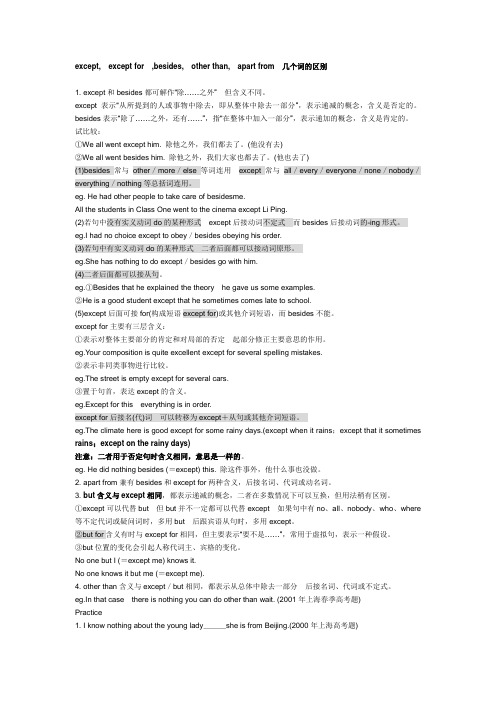
except, except for ,besides, other than, apart from 几个词的区别1. except和besides都可解作“除……之外”但含义不同。
except表示“从所提到的人或事物中除去,即从整体中除去一部分”,表示递减的概念,含义是否定的。
besides表示“除了……之外,还有……”,指“在整体中加入一部分”,表示递加的概念,含义是肯定的。
试比较:①We all went except him. 除他之外,我们都去了。
(他没有去)②We all went besides him. 除他之外,我们大家也都去了。
(他也去了)(1)besides常与other/more/else等词连用except常与all/every/everyone/none/nobody/everything/nothing等总括词连用。
eg. He had other people to take care of besidesme.All the students in Class One went to the cinema except Li Ping.(2)若句中没有实义动词do的某种形式except后接动词不定式而besides后接动词的-ing形式。
eg.I had no choice except to obey/besides obeying his order.(3)若句中有实义动词do的某种形式二者后面都可以接动词原形。
eg.She has nothing to do except/besides go with him.(4)二者后面都可以接从句。
eg.①Besides that he explained the theory he gave us some examples.②He is a good student except that he sometimes comes late to school.(5)except后面可接for(构成短语except for)或其他介词短语,而besides不能。
except、exceptfor和besides的区别

besides 是包括的,这个是他们的不同。
比如besides Jim, his classmates are all sixteen years old.这里Jim就也是16岁,而第一句里的就不包括except for/except是说,除了这个,其他的还有什么,不再包括说了的。
比如,his classmates are all sixteen years old except Jim.这里是不包括Jim的。
except是形容同类事物,except for是不同类的。
比如刚才举的那个例子,classmates 和Jim都是学生(至少都是人吧)所以用except.这个句子:The article is good except for a few mistake.这里的mistake和article就不是同一类吧,所以用except forexcept意为"只有……除外;除去……",后跟名词或代词作宾语,强调从整体中除去部分,即except后的部分不包括在整体之内。
因此,常和all, everything, no one, nothing等词一起使用。
其判别标志是:除去的与保留的是"同类项"。
except for...是"除了因为……;要不是……;除去……一点外"的意思,表示"对一个人或事物,先做一个整体评价,然后再就局部提出一点看法"。
即一部分被肯定,另一部分被否定,这就是所谓的"排除否定式"。
其判别标志是:除去的与保留的"不是同类项"。
besides相当于as well as,意为"除了……以外还有……",即"除去一部分还有另外一部分"的意思,表示besides 后面的部分包括在整体之内。
except和except for的区别

except和except for的区别在英语中,except与except for均可表示“除……之外”的意思,两者在使用上也有所差异,本文详细介绍了它们之间的区别。
首先,使用except的地方通常比except for更加广泛。
Except 可以用作连接词,表示“但是,不包括”,例如:All the students were present except John.句话的意思是“所有学生都出席,除了约翰。
”另外,except也可以用作介词,表示“除了,除”,例如:All the students were present except for John.句话的意思是“所有学生都出席,除了约翰。
”其次,except for有着较为狭窄的使用范围,它只能用作介词,表示“除了,除外”,例如:Everyone was there except for John.句话的意思是“每个人都在那里,除了约翰。
”再者,except for有时表达的概念会比except更为广泛。
具体地说,except for表达的范围可以更多数量的概念,例如:They except for John went to the game.句话的意思是“他们(不仅仅是一个人,而是多个人)除了约翰之外,都去了比赛。
”总而言之,except和except for均可表示“除……之外”的意思,但它们在使用上是有差异的,except可以用作连接词与介词,而except for则只能用作介词。
并且except for表达的范围更为广泛,允许表达更多数量的概念。
此外,使用except的地方也更加广泛。
因此,想要正确使用except和except for,关键在于要熟记以上内容,严格按照语法规则去使用它。
exceptfor与except区别

exceptfor与except区别
except和except for的区别主要有:
1.在意义上的区别:except主要用来谈论同类的东西,而except for则主要用来谈论不同类的东西,在说明情况后作细节上的修正,有时含有惋惜之意。
2.用于句首时的区别:此时只用except for,不用except。
3.两者可以互换的场合:当用于all,every,no,everything,anybody,nobody,nothing,none,no one等表示概括性的词语后面时,两者可互换。
4.固定搭配:except for的后面只能接名词或名词短语。
My manager loves my report except for the few mistakes I made. 除了几个错误以外,我的经理觉得我的这份报告很好。
5.用法:当句子中使用的谓语是单词do的任何形式时,那么except的后面接动词原形,所表示的意思和but相同。
6.语义:两者都有“期望,期待”的意思,但接续不同。
except 后面可接名词、代词、动词、副词、介词短语和从句等。
except for 后面是加名词,有时候这个结构也可以改写成except+that从句。
总的来说,except和except for的区别在于它们的使用方式和语义重点不同。
具体使用时需要根据语境和表达需要选择合适的词语。
- 1、下载文档前请自行甄别文档内容的完整性,平台不提供额外的编辑、内容补充、找答案等附加服务。
- 2、"仅部分预览"的文档,不可在线预览部分如存在完整性等问题,可反馈申请退款(可完整预览的文档不适用该条件!)。
- 3、如文档侵犯您的权益,请联系客服反馈,我们会尽快为您处理(人工客服工作时间:9:00-18:30)。
一、 except用于表示同类事物之间的关系,其意为"除……以外"、"除去"。
1. except后面可接名词、代词、动词、副词、介词短语和从句等。
如:
We have an English lesson every day except Sunday. 除星期天外,我们每天有一堂英语课。
(接名词)
They all went to the park last Sunday except him. 除了他以外,上星期天他们都去公园了。
(接代词)
Every day Mary does nothing except watch TV. 每天玛丽除了看电视以外什么都不干。
(except 后接动词时,一般为带to的动词不定式。
但如果except前面有谓语动词do或其相应形式时,后面通常接省略to的动词不定式。
如此句。
)
He always goes to work by bike except recently. 除最近外,他一般都骑自行车上班。
(接副词)
After breakfast the students went nowhere except to school. 吃完早餐,学生们除了上学就不到别处去了。
(接介词短语)
My father usually goes to work by bike except when it rains. 除下雨天外,我爸爸通常骑自行车上班。
(接从句)
2. except常用在all, whole, any, every, no等词,及anything, anybody, anyone, everything, everybody, everyone等不定代词之后。
如:
She ate everything on the plate except the carrots.除胡萝卜外她把盘子里的东西都吃了。
I've cleaned all the rooms except the toilet. 除了厕所,我清扫了所有房间。
二、 except for用于表示对主要部分的肯定和对局部的否定。
它不表示同类事物之间的关系,其意思为:
1. "除了……以外"。
如:
Smith is a good man, except for his bad temper. 史密斯除了脾气不好外,是个好人。
The movie was good except for the ending. 这部电影除了结尾之外都很好。
2. "除去为了……"。
如:
Mother wouldn't give him any money except for books and stationery. 除了买书和文具外,妈妈不给他任何钱。
3. "如果不是","若非"。
如:
Except for you, I would pass the exam. 如果不是你,我就会通过考试。
4. "except for+名词"结构一般可以改写成"except+that从句"。
如:
This will do except for the length.= This will do except that it is too long. 如果不是它太长的话,这会很好。
All are here except for the absence of Tina. = All are here except that Tina is absent. 除了蒂娜以外,大家都在这里。
三、 except与except for的互换
1. except与except for有时可以通用,不过,一般情况下,except for可置于句首,而except 则不能。
如:
Everyone is here except Tom. (或:Except for Tom everyone is here.)除汤姆外,大家都到了。
2. except与except for在句中也可互换。
一般来说,否定句中用except,肯定句式可以用except for来替换。
如:
This article has no blunders except a few mistakes.这篇文章除了一点小错外没有大错。
此句可改为:This article is instructive except for a few blunders. 这篇文章除了有些错误外,是有教育意义的。
不过,在前后有相称的同类词语时,应用except,否则用except for。
如:
We come to school every day except Sunday. 除星期天外,我们天天上学。
(句中every day与Sunday同类)
This dress is ready except for the buttons. 衣服做好了,只是钮扣未缝上。
(句中ready与buttons 不同类)
四、 excepting是由动词转化而来的分词介词,用法较正式,含有较强的动态意味,意为"把……除外",与except在用法上有不同之处:
1. 可用于句首,或用于not, without, always等词后;
2. 其后常常用名词或代词。
如:
Bruce answered all the questions excepting the last one. 除了最后一个问题外,布鲁斯都答出来了。
Excepting Sundays, the library is open daily. 除了星期天外,图书馆天天开放。
I think we must keep improving our English not excepting those who have mastered it. 我认为我们必须不断提高我们的英语水平,对那些已掌握了英语的人也不例外。
All the people in my family go to work every day, always excepting my youngest sister. 我家所有的人每天都上班,除了我那个最小的妹妹以外。
巩固练习:
用except, except for或excepting填空。
1. She usually goes to work on her bike ________ when it rains.
2. The whole staff, not ________ the heads of departments, went to the playground.
3. His account is correct ________ that some details are omitted (省略,遗漏).
4. The office is empty ________ Alice.
5. I would go ________ it's too late.
6. All the essays are good ________ John's.
7. Everybody must study, ________ those who have a better grasp of Marxism.
8. The wall was bare ________ a map of the world.
9. I have looked for my wallet everywhere ________ there.
10. I would join you ________ my headache.
11. We can ask him for some advice at any time ________ during his holidays.
12. His composition is good, ________ some spelling mistakes.
13. John wasn't remembered, ________ by some of us who had known him.
14. There was silence in the room, ________ the tick of the clock on the wall.
15. The pair of trousers fits me well ________ the waist of it is a little too small.
Key:
1. except
2. excepting
3. except
4. except for
5. except
6. except
7. excepting
8. except for
9. exce pt 10. except for 11. except 12. except for 13. except 14. except for 15. except。
